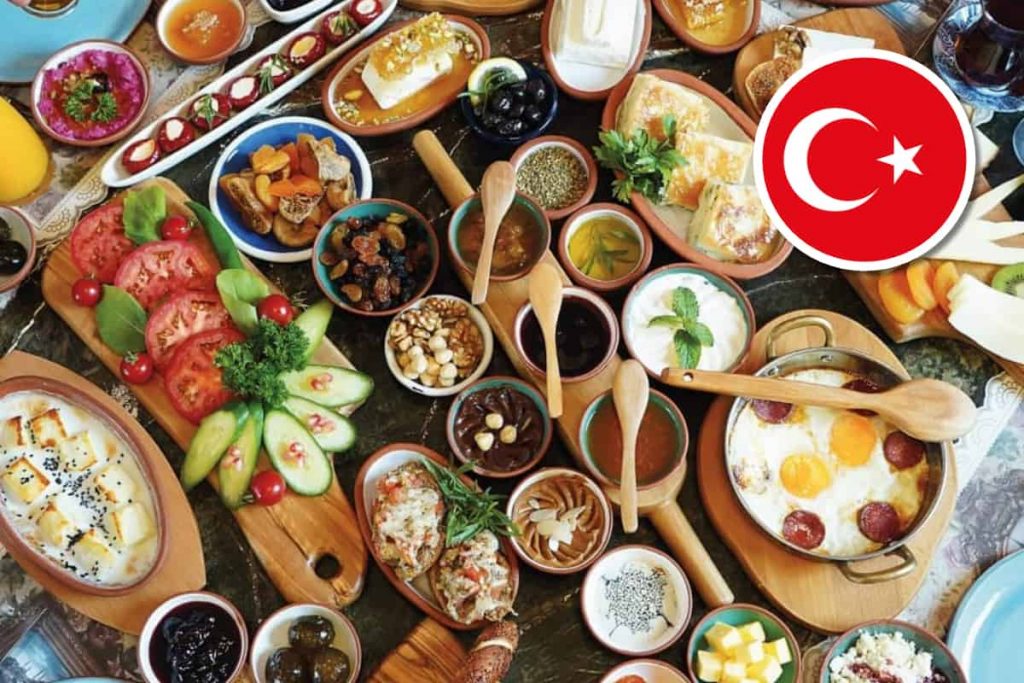
Turkey, a country renowned for its rich history and vibrant culture, is also a treasure trove when it comes to culinary delights. Turkish food, with its bold flavors, aromatic spices, and diverse influences, has captivated food lovers around the world. In this article, we will embark on a journey through the captivating world of Turkish cuisine, exploring fascinating Turkish food facts that will leave your taste buds tingling with anticipation.
- The Mosaic of Turkish Flavors
A Melting Pot of Culinary Traditions
When it comes to Turkish food, one cannot ignore the diverse influences that have shaped its culinary landscape over centuries. Turkish cuisine is a magnificent blend of Middle Eastern, Central Asian, Mediterranean, and Balkan flavors, resulting in a unique and delectable fusion. From the richness of Ottoman cuisine to the fiery spices of southeastern Anatolia, each region within Turkey offers a distinct culinary experience.
Staple Ingredients: From Grains to Herbs
Turkish cuisine boasts a wide array of staple ingredients that form the foundation of its dishes. Grains such as bulgur, rice, and lentils are prevalent, providing a hearty base for many traditional meals. Fresh herbs like parsley, dill, and mint lend vibrant flavors to dishes, while olive oil and yogurt add a creamy and tangy touch. These ingredients, combined with the skillful use of spices like cumin, sumac, and paprika, create a harmonious symphony of tastes.
- Iconic Turkish Dishes
The Mighty Kebab: A Global Culinary Icon
When discussing Turkish cuisine, it is impossible to overlook the iconic kebab. From juicy Adana kebabs to succulent shish kebabs, these flavorful grilled meat skewers have gained international acclaim. Served with fragrant rice, salad, and warm bread, kebabs offer a tantalizing feast for both the eyes and the palate.
Heavenly Sweet Treats: Baklava and Turkish Delight
Turkish cuisine is renowned for its indulgent sweets that provide a delightful conclusion to any meal. Baklava, with its layers of flaky pastry, nuts, and sweet syrup, is a true masterpiece. Another beloved treat is Turkish delight, a gel-like confectionery infused with flavors such as rose, pistachio, and lemon. These delicacies are a testament to the Turks’ mastery of dessert-making.
- Turkish Food: A Social Experience
Sharing Mezze: A Celebration of Togetherness
One of the most enchanting aspects of Turkish cuisine is the tradition of sharing mezze, small appetizer plates that grace the table before a meal. These delectable bites, such as hummus, stuffed grape leaves, and eggplant dip, encourage conversation and foster a sense of community. The act of savoring mezze with friends and family reflects the Turkish belief that food is best enjoyed when shared.
Traditional Tea: A Ritual of Hospitality
In Turkey, tea is not merely a beverage; it is a symbol of hospitality and warmth. Turkish tea, brewed in a double teapot called a “çaydanlık,” is a common sight in homes, cafes, and even street corners. Served in petite glasses, sipping on hot tea is a cherished ritual that invites people to unwind, connect, and engage in heartfelt conversations.
Turkish food, with its fascinating blend of flavors, cultural influences, and social traditions, continues to enthrall gastronomes worldwide. From the sizzling kebabs to the delicate layers of baklava, every bite tells a story of centuries-old traditions and the love for flavors. Exploring Turkish cuisine is like embarking on a culinary adventure that reveals the heart and soul of a nation.
As you delve deeper into the world of Turkish food, you will discover an endless array of dishes, each with its own unique story and preparation method. Whether you’re indulging in a hearty bowl of lentil soup, savoring the rich flavors of Turkish pide (flatbread) topped with cheese and meats, or relishing the delicate layers of a traditional manti (dumplings) dish, Turkish cuisine never fails to tantalize the senses.
Moreover, Turkish food facts extend beyond the realm of taste and aroma. They are deeply intertwined with the country’s cultural heritage and historical significance. For instance, some dishes like the imam bayildi (stuffed eggplant) carry stories of Ottoman traditions, while others like the Turkish breakfast spread known as “kahvaltı” reflect the importance of fresh and locally sourced ingredients.
To truly appreciate Turkish food, one must also explore the vibrant markets and bazaars where these culinary treasures come to life. The bustling streets of Istanbul’s Grand Bazaar or the lively markets of Izmir offer a sensory experience like no other, with colorful displays of spices, aromatic herbs, and an assortment of fresh produce. Immerse yourself in this lively atmosphere and let the sights, sounds, and scents guide your culinary journey.
Furthermore, Turkish food is not limited to the confines of Turkey itself. It has made its way across borders, enticing global palates and gaining recognition as a delicious and wholesome cuisine. Turkish restaurants and food establishments have sprung up in various corners of the world, introducing people to the rich flavors and cultural tapestry of Turkish cuisine.
Turkish food facts unravel a story of culinary passion, cultural heritage, and the joy of communal dining. From the intricate preparations to the aromatic spices, every aspect of Turkish cuisine reflects the country’s diverse history and vibrant traditions. So, whether you find yourself savoring a kebab on the streets of Istanbul or enjoying a homemade Turkish delight, let the flavors transport you to the captivating world of Turkish gastronomy. Embrace the magic of Turkish food and embark on a culinary adventure that will leave you craving for more.